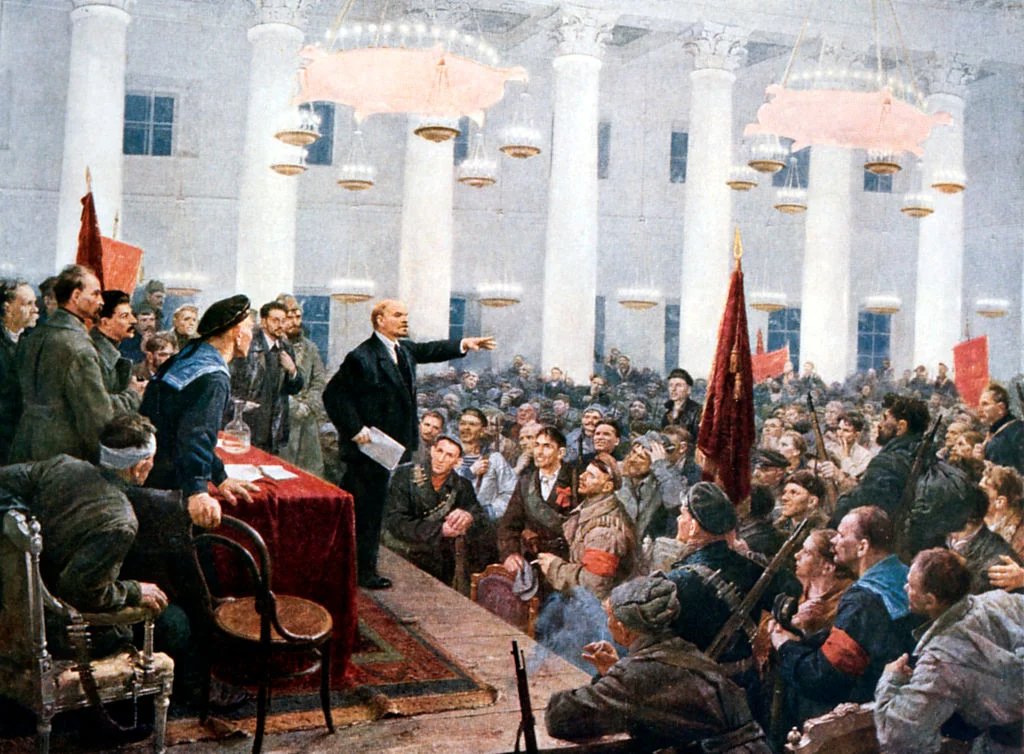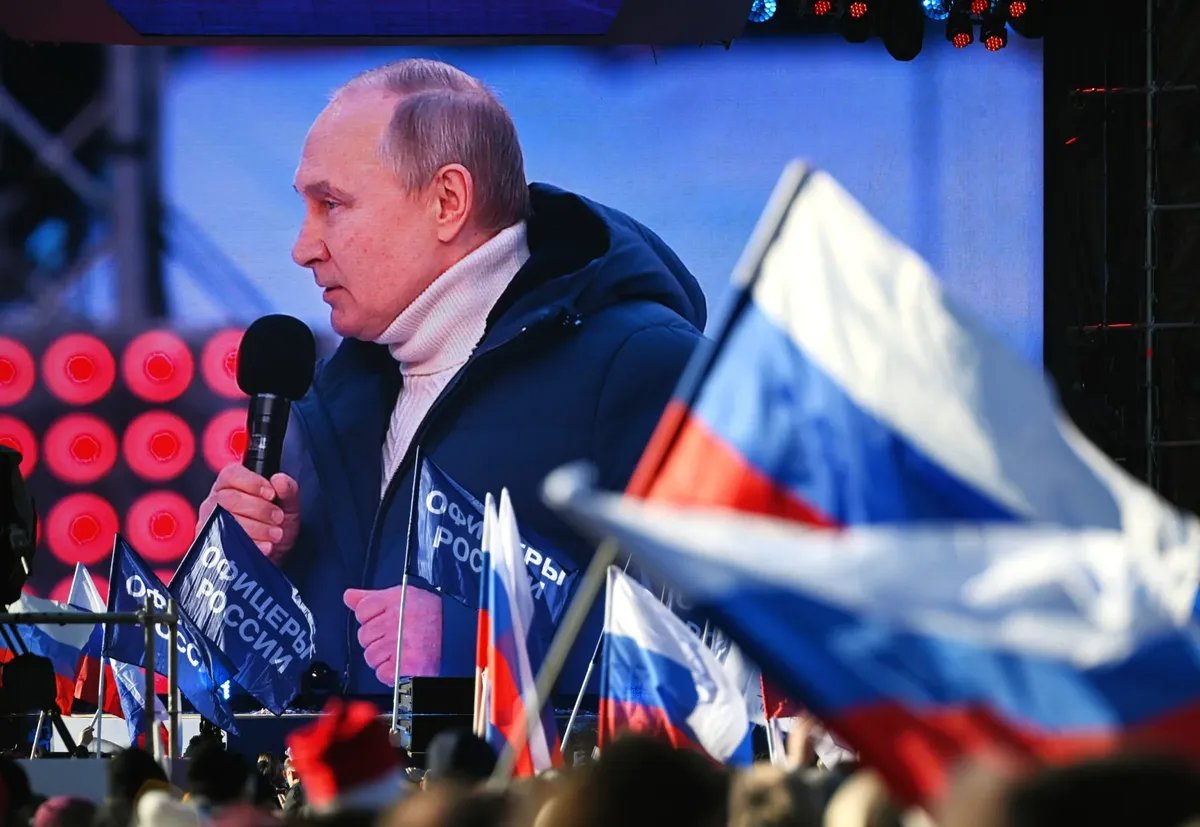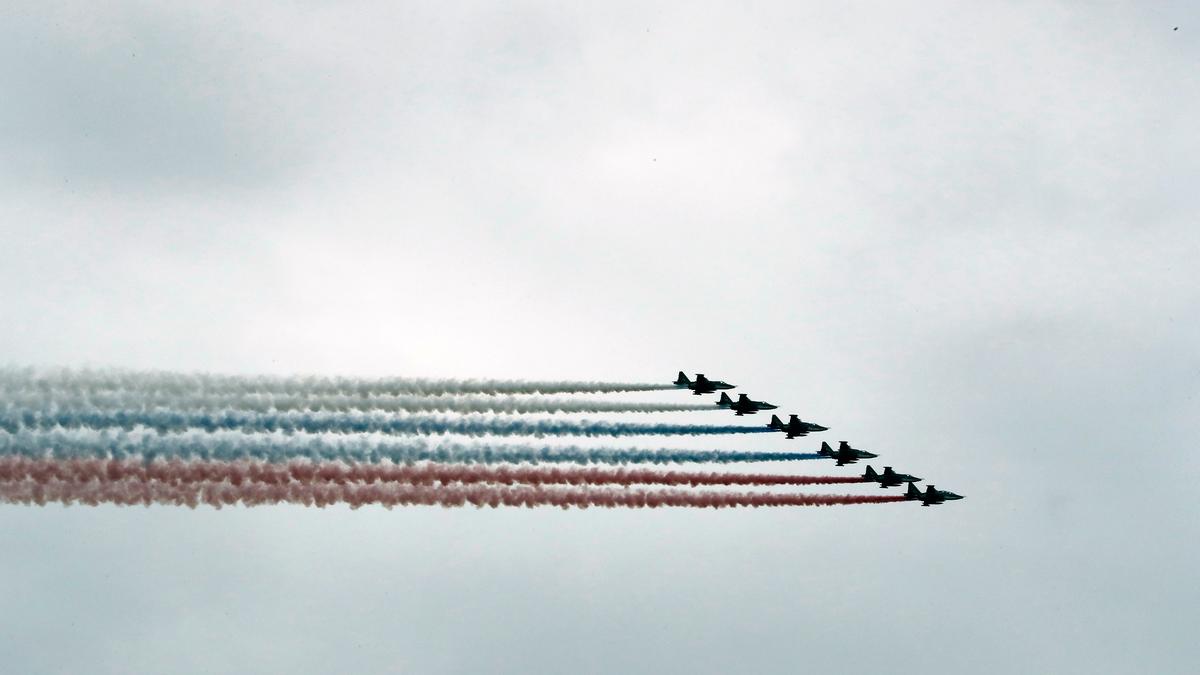Since the full-scale invasion of Ukraine and the subsequent mass migration of Russians, the term “imperial thinking“ has suddenly become fashionable. What exactly does the term mean?
Russian historian and writer Ilya Budraitskis observes that an imperial consciousness is built around the idea of oneself and one’s culture as “correct”, and having the “right moral values”. In the Russian context, imperial consciousness is rooted in the Russian Empire, which governed all national outposts according to an imperial model, Budraitskis believes, adding however, that such discourse is not a uniquely Russian phenomenon. “Let’s not pretend that Russia is the only empire or imperial relic and that everyone else is completely free of such thinking.”
Budraitskis believes that the desire of smaller so-called “vassal nations” for independence and resistance played an important role in the revolution of 1917.

Lenin address the Second Congress of Soviets at Smolny. Source: Ann Ronan Pictures / Print Collector / Getty Images
Lenin believed that the trend towards national self-determination was unstoppable. “On the one hand, the USSR imposed imperial practices on a monstrous scale: it oppressed nations, and deported people en masse. Yet on the other hand, there was some form of recognition of former vassal nations that were given their own republics and developed as separate nations,” says Budraitskis.
Putin and ‘good colonialism’
One of Putin’s top priorities since assuming the presidency has been preventing the possible collapse of the country. In 2005, Putin famously called the collapse of the USSR “the greatest geopolitical catastrophe of the century”, and in 2015 he mused that the resulting “epidemic of disintegration” had also spread to Russia itself.
Vasilina Orlova, a Russian anthropologist based in the US, notes that imperial consciousness is based on certain strongly held, if totally untrue beliefs such as Russia has never lost a war, Russians are the most generous people, Russian colonialism was far less harsh than that of other colonial nations, Russians have never committed atrocities or genocide, and finally, that Russia has never erased national identities and that national groups have only ever joined Russia of their own free will.
Putin refers to these notions often. In a 2020 article about World War II in American online publication The National Interest, he wrote that the incorporation of Latvia, Lithuania and Estonia into the Soviet Union was carried out in line with international and state law of that time.

Photo: EPA-EFE / VLADIMIR ASTAPKOVICH / SPUTNIK / POOL MANDATORY CREDIT
Putin also claims that Ukraine was a creation of Soviet rule, and that its creation led to the loss of some southern Russian lands. In a 2021 article “On the historical unity of Russians and Ukrainians”, he wrote that “Russians and Ukrainians are one people, a single whole”.
“Putin thinks Ukrainians’ main problem is that they have forgotten they are Russians,” Budraitskis says, adding that for Putin ”the Russian invasion means restoring objective reality, with the empire the vehicle for that objectivity. The ‘Russian world’ isn’t just about Russia. It’s also about how the world should be.”
“The aim in attacking Ukraine was to create a triune state [of Russians, Ukrainians and Belarusians]. This is very much a colonial war, dressed up in genocidal clothes,” Orlova adds.
Colonial wars and the Russian language
Russia has waged colonial wars throughout its history and the past two decades are no exception: the Chechen wars, the invasion of Georgia in 2008, the 2014 intervention in eastern Ukraine, and now all-out war with Ukraine.
“It is the imposition of ideology through violence. It is how Russia was formed. The country developed and grew to include Siberia, absorbing these territories via wars of conquest, which became the norm in the Russian consciousness,” says Orlova.
Another point of state policy since Putin came to power has been the further Russification of the population.
Constituent Russian republics have been systematically deprived of elements of their autonomy, culture and even the right to their own language.
One of the most striking examples has occurred in Tatarstan. Since 2017, it has no longer been compulsory to study Tatar in school. Nowadays, pupils may only study Tatar with written consent from their parents for two hours a week.
The expectation that other nations will only speak Russian also extends to neighbouring sovereign states. Following talks with Putin in the Kazakh capital Astana on 9 November, Kazakh President Kassym-Jomart Tokayev made his closing address in his native Kazakh, much to the visible surprise of Putin and the rest of the Russian delegation who were seen scrambling to put on headphones. A Kazakh politician speaking Kazakh in Kazakhstan caught them totally off-guard.
Imperialism by default
Historical factors, education and state propaganda have all helped form this “imperial viewpoint” in some Russians. It is difficult to modify such a worldview once it has formed gradually over decades. In modern Russia, there has never been a critical reassessment of the country’s imperial legacy, and attempts to even discuss various historic wrongdoings are perceived by many as an attack on the Russian state’s modern foundations.
Russian mass migration since the start of the war to now independent countries that were once part of the Soviet Union and even the Russian empire before that, has lent the “imperial consciousness” a new topicality.
“The main concern is imperialism and chauvinism, which many white Russians consider the norm,” a Bishkek native told Idel.Realii, part of the Tatar-Bashkir service of Radio Free Europe/Radio Liberty.
“Given that our own migrants have faced decades of systemic xenophobia in Russia, where non-whites are seen as second-class citizens and are subjected to violence and discrimination due to their race and nationality, I share the worries and fears of my countrymen that we will have to face this at home now too.”
If we fail to acknowledge the past in its entirety, there is always the risk that the same mistakes will be repeated. Orlova continues, “Reshaping consciousness changes behaviour. The willingness to acknowledge imperialism is currently a marginal point of view [in Russia]. There is a lot of negativity and resentment around it. But it should really be part of the collective consciousness. Starting to think about it now is the only way for Russians to change the current suicidal trajectory they’re on.”
Join us in rebuilding Novaya Gazeta Europe
The Russian government has banned independent media. We were forced to leave our country in order to keep doing our job, telling our readers about what is going on Russia, Ukraine and Europe.
We will continue fighting against warfare and dictatorship. We believe that freedom of speech is the most efficient antidote against tyranny. Support us financially to help us fight for peace and freedom.
By clicking the Support button, you agree to the processing of your personal data.
To cancel a regular donation, please write to [email protected]

